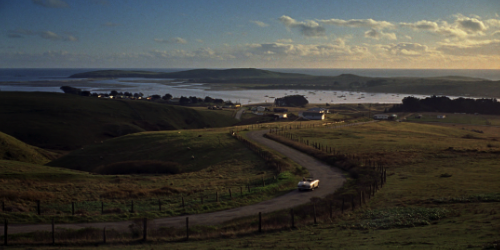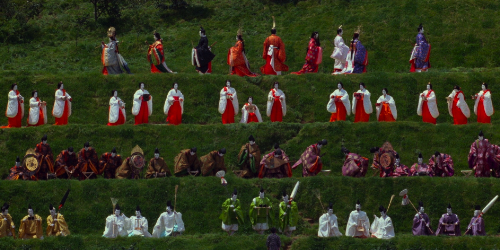"I made you in my image"
Monday, February 18, 2019
Wednesday, February 6, 2019
possession, delusion, vision, hypnotism, trance, hallucination, and narcosis
Indeed, Artaud likens the cinema to possession, delusion, vision, hypnotism, trance, hallucination, and narcosis because, in all of these experiences, we are inhabited by an "other" logic, our brain and bodies given over to a force that lies outside of us. With respect to the moving image, Artaud's question is not, What is the nature of thinking? but, What is this thing that thinks inside of me?
G-d inscribes a "law" in us that makes us equal to the incredible variety of nature.
-- from Gregory Flaxman, "This is Your Brain on Cinema"
G-d inscribes a "law" in us that makes us equal to the incredible variety of nature.
-- from Gregory Flaxman, "This is Your Brain on Cinema"
Monday, January 28, 2019
Monday, January 21, 2019
Parallax, or the Story of the Three Steeples
At a bend in the road I experienced, suddenly, that special pleasure, which bore no resemblance to any other, when I caught sight of the twin steeples of Martinville, on which the setting sun was playing, while the movement of the carriage and the windings of the road seemed to keep them continually changing their position; and then of a third steeple, that of Vieuxvicq, which, although separated from them by a hill and a valley, and rising from rather higher ground in the distance, appeared none the less to be standing by their side.
In ascertaining and noting the shape of their spires, the changes of aspect, the sunny warmth of their surfaces, I felt that I was not penetrating to the full depth of my impression, that something more lay behind that mobility, that luminosity, something which they seemed at once to contain and to conceal.
The steeples appeared so distant, and we ourselves seemed to come so little nearer them, that I was astonished when, a few minutes later, we drew up outside the church of Martinville. I did not know the reason for the pleasure which I had found in seeing them upon the horizon, and the business of trying to find out what that reason was seemed to me irksome; I wished only to keep in reserve in my brain those converging lines, moving in the sunshine, and, for the time being, to think of them no more. And it is probable that, had I done so, those two steeples would have vanished for ever, in a great medley of trees and roofs and scents and sounds which I had noticed and set apart on account of the obscure sense of pleasure which they gave me, but without ever exploring them more fully. I got down from the box to talk to my parents while we were waiting for the Doctor to reappear. Then it was time to start; I climbed up again to my place, turning my head to look back, once more, at my steeples, of which, a little later, I caught a farewell glimpse at a turn in the road. The coachman, who seemed little inclined for conversation, having barely acknowledged my remarks, I was obliged, in default of other society, to fall back on my own, and to attempt to recapture the vision of my steeples. And presently their outlines and their sunlit surface, as though they had been a sort of rind, were stripped apart; a little of what they had concealed from me became apparent; an idea came into my mind which had not existed for me a moment earlier, framed itself in words in my head; and the pleasure with which the first sight of them, just now, had filled me was so much enhanced that, overpowered by a sort of intoxication, I could no longer think of anything but them. At this point, although we had now travelled a long way from Martinville, I turned my head and caught sight of them again, quite black this time, for the sun had meanwhile set. Every few minutes a turn in the road would sweep them out of sight; then they shewed themselves for the last time, and so I saw them no more.
Without admitting to myself that what lay buried within the steeples of Martinville must be something analogous to a charming phrase, since it was in the form of words which gave me pleasure that it had appeared to me, I borrowed a pencil and some paper from the Doctor, and composed, in spite of the jolting of the carriage, to appease my conscience and to satisfy my enthusiasm, the following little fragment, which I have since discovered, and now reproduce, with only a slight revision here and there.
Alone, rising from the level of the plain, and seemingly lost in that expanse of open country, climbed to the sky the twin steeples of Martinville. Presently we saw three: springing into position confronting them by a daring volt, a third, a dilatory steeple, that of Vieuxvicq, was come to join them. The minutes passed, we were moving rapidly, and yet the three steeples were always a long way ahead of us, like three birds perched upon the plain, motionless and conspicuous in the sunlight. Then the steeple of Vieuxvicq withdrew, took its proper distance, and the steeples of Martinville remained alone, gilded by the light of the setting sun, which, even at that distance, I could see playing and smiling upon their sloped sides. We had been so long in approaching them that I was thinking of the time that must still elapse before we could reach them when, of a sudden, the carriage, having turned a corner, set us down at their feet; and they had flung themselves so abruptly in our path that we had barely time to stop before being dashed against the porch of the church.
We resumed our course; we had left Martinville some little time, and the village, after accompanying us for a few seconds, had already disappeared, when, lingering alone on the horizon to watch our flight, its steeples and that of Vieuxvicq waved once again, in token of farewell, their sun-bathed pinnacles. Sometimes one would withdraw, so that the other two might watch us for a moment still; then the road changed direction, they veered in the light like three golden pivots, and vanished from my gaze. But, a little later, when we were already close to Combray, the sun having set meanwhile, I caught sight of them for the last time, far away, and seeming no more now than three flowers painted upon the sky above the low line of fields. They made me think, too, of three maidens in a legend, abandoned in a solitary place over which night had begun to fall; and while we drew away from them at a gallop, I could see them timidly seeking their way, and, after some awkward, stumbling movements of their noble silhouettes, drawing close to one another, slipping one behind another, shewing nothing more, now, against the still rosy sky than a single dusky form, charming and resigned, and so vanishing in the night.
I never thought again of this page, but at the moment when, on my corner of the box-seat, where the Doctor's coachman was in the habit of placing, in a hamper, the fowls which he had bought at Martinville market, I had finished writing it, I found such a sense of happiness, felt that it had so entirely relieved my mind of the obsession of the steeples, and of the mystery which they concealed, that, as though I myself were a hen and had just laid an egg, I began to sing at the top of my voice.
- Marcel Proust, from "Swann's Way"
Monday, January 7, 2019
Sunday, January 6, 2019
Sunday, December 30, 2018
Thursday, October 25, 2018
Wednesday, October 17, 2018
Monday, October 15, 2018
Wednesday, October 10, 2018
Sunday, September 30, 2018
Friday, September 7, 2018
Wednesday, September 5, 2018
Singularity
"What is an ideal event? It is a singularity -- or rather a set of singularities or of singular points characterizing a mathematical curve, a physical state of affairs, a psychological and moral person. Singularities are turning points and points of inflection; bottlenecks, knots, foyers, and centers; points of fusion, condensation, and boiling; points of tears and joy, sickness and health, hope and anxiety, "sensitive" points...The singularity belongs to another dimension than that of denotation, manifestation, or signification. It is essentially pre-individual, non-personal, and a-conceptual. It is quite different to the individual and the collective, the personal and the impersonal, the particular and the general -- and to their oppositions. Singularity is neutral. On the other hand, it is not "ordinary": the singular point is opposed to the ordinary." LS (52)
Thursday, August 30, 2018
Wednesday, August 22, 2018
Friday, August 3, 2018
Saturday, July 21, 2018
Wednesday, July 11, 2018
Wednesday, June 6, 2018
Thursday, May 31, 2018
Love had a thousand shapes
"Fifty pairs of eyes were not enough to get round that one woman with, she thought" [cf. el aleph]
"She was not inventing; she was only trying to smooth out something she had been given years ago folded up; something she had seen."
- Virginia Woolf, To the Lighthouse
"She was not inventing; she was only trying to smooth out something she had been given years ago folded up; something she had seen."
- Virginia Woolf, To the Lighthouse
Sunday, May 20, 2018
Sunday, May 6, 2018
Sunday, April 29, 2018
Sunday, April 15, 2018
Tuesday, April 10, 2018
Tuesday, March 13, 2018
Sunday, February 4, 2018
Monday, January 29, 2018
Proust
"For there were, in the environs of Combray, two 'ways' which we used to take for our walks, and so diametrically opposed that we would actually leave the house by a different door, according to the way we had chosen: the way towards Méséglise-la-Vineuse, which we called also 'Swann's way,' because, to get there, one had to pass along the boundary of M. Swann's estate, and the 'Guermantes way.'" - Proust
Saturday, January 6, 2018
Wednesday, August 16, 2017
Sunday, June 25, 2017
Wednesday, May 3, 2017
Saturday, April 15, 2017
Agnes Martin
"The panic of complete helplessness drives us to fantastic extremes...But helplessness when fear and dread have run their course, as all passions do, is the most rewarding state of all.”
Thursday, April 13, 2017
Sunday, April 9, 2017
Sunday, March 12, 2017
Saturday, March 11, 2017
Sunday, March 5, 2017
Wednesday, December 28, 2016
Sunday, December 18, 2016
Tuesday, December 13, 2016
Tuesday, November 22, 2016
Wednesday, November 9, 2016
Wednesday, October 5, 2016
Monday, September 26, 2016
Chaplin's Desires
“We think to much and feel too little…what do you want a meaning for? Life is a desire, not a meaning.”
– Charlie Chaplin
– Charlie Chaplin
Friday, August 19, 2016
Friday, July 15, 2016
Tuesday, June 14, 2016
Sunday, April 24, 2016
Thursday, March 10, 2016
Bartleby
The thing that fascinates me about Bartleby as deconstructed in Deleuze's "The Formula" is that in his impotence, his silence, his passivity, and his reticence he sparks the world to want to destroy or change him. It is not that he is unknowing - he knows what the attorney asks of - but all the more it is his knowing that spark a confounded rage. It is as if evil exists in the world, and what it seeks is characters like Bartleby, who feign weakness, because their strength is virtual, abstract. They may own nothing, but it is their possession of the knowledge (which is neither an affirmation nor a negation) of the futility of their counterparts that makes them despised. They could take action supposedly, but they "prefer not to". And why is that? "Do I dare to eat a peach?" says Prufrock. Do they lack the organizational skills to mount an effort, or do they feel doomed to failure, or are they addicted to feeding the ego depressed nihilistic thoughts, or are they simply catatonic due to a head trauma? Perhaps they feel to disturb the universe is immoral. Evil seeks out Bartleby, just as it seeks out Gregor Samsa, just as it seeks out Prufrock. Like a sugar ant drawn by the minutest vibrational scent of a cookie crumb from across the room, evil senses an amplitude that lies within Bartleby. It is not that the attorney is evil per se, but desire is his formula, where Bartleby's is a cloak of indiscernability, a poorly evolved protective mechanism that must be the result of some recessive gene. It is no wonder that he hides under his desk, wouldn't you if you knew what he did?
Sunday, December 27, 2015
Split the duchies / Have you seeing doubles like Noah
Thursday, December 10, 2015
Ginger is a Tuber
He lives, then, on ginger-nuts, thought I; never eats a dinner, properly speaking; he must be a vegetarian then; but no; he never eats even vegetables, he eats nothing but ginger-nuts. My mind then ran on in reveries concerning the probable effects upon the human constitution of living entirely on ginger-nuts. Ginger-nuts are so called because they contain ginger as one of their peculiar constituents, and the final flavoring one. Now what was ginger? A hot, spicy thing. Was Bartleby hot and spicy? Not at all. Ginger, then, had no effect upon Bartleby. Probably he preferred it should have none.
-Herman Melville, "Bartleby, the Scrivener"
-Herman Melville, "Bartleby, the Scrivener"
Sunday, November 15, 2015
Friday, November 13, 2015
Wednesday, November 11, 2015
Derrida's Tribute to Deleuze
http://www.usc.edu/dept/comp-lit/tympanum/1/derrida.html
"The historian of philosophy who proceeded with a sort of configurational election of his own genealogy,..."
Deleuze on Marxism: "What interests us the most is the analysis of capitalism as an immanent system that constantly pushes back its proper limits, and that always finds them again on a larger scale, because the limit is Capital itself."
"The historian of philosophy who proceeded with a sort of configurational election of his own genealogy,..."
Deleuze on Marxism: "What interests us the most is the analysis of capitalism as an immanent system that constantly pushes back its proper limits, and that always finds them again on a larger scale, because the limit is Capital itself."
Sunday, November 1, 2015
Sunday, October 25, 2015
Thursday, October 22, 2015
A Heap See
Check out the enfolded dimension at 0:33:
"That day...everything was possible...Future became present...that is, no more time, a glimpse of eternity." - Michelet
Thursday, October 15, 2015
Tuesday, October 6, 2015
Thursday, September 3, 2015
Wednesday, September 2, 2015
Monday, August 24, 2015
Sunday, August 9, 2015
We looked at each other, for a long strange moment that I’ve never forgotten, actually, like two animals meeting at twilight, during which some clear, personable spark seemed to fly up through his eyes and I saw the creature he really was – and he, I believe, saw me. For an instant we were wired together and humming, like two engines on the same circuit.
- Donna Tartt, The Goldfinch
- Donna Tartt, The Goldfinch
Thursday, July 9, 2015
Sunday, June 21, 2015
"They're two, they're four, they're six, they're eight,"
From: http://www.allthelyrics.com/lyrics/thomas_the_tank_engine/thomas_and_his_friends_tv_theme_song-lyrics-526221.html
From: http://www.allthelyrics.com/lyrics/thomas_the_tank_engine/thomas_and_his_friends_tv_theme_song-lyrics-526221.html
Saturday, June 20, 2015
Thursday, May 14, 2015
Wednesday, March 25, 2015
Thursday, February 19, 2015
Monday, February 9, 2015
Sunday, February 8, 2015
Thursday, January 29, 2015
Tuesday, January 6, 2015
Thursday, December 25, 2014
Tuesday, December 23, 2014
Tuesday, December 9, 2014
Friday, December 5, 2014
Thursday, November 20, 2014
Thursday, November 13, 2014
Tuesday, November 11, 2014
Wednesday, October 8, 2014
Tuesday, September 16, 2014
Thursday, September 4, 2014
Subscribe to:
Posts (Atom)










